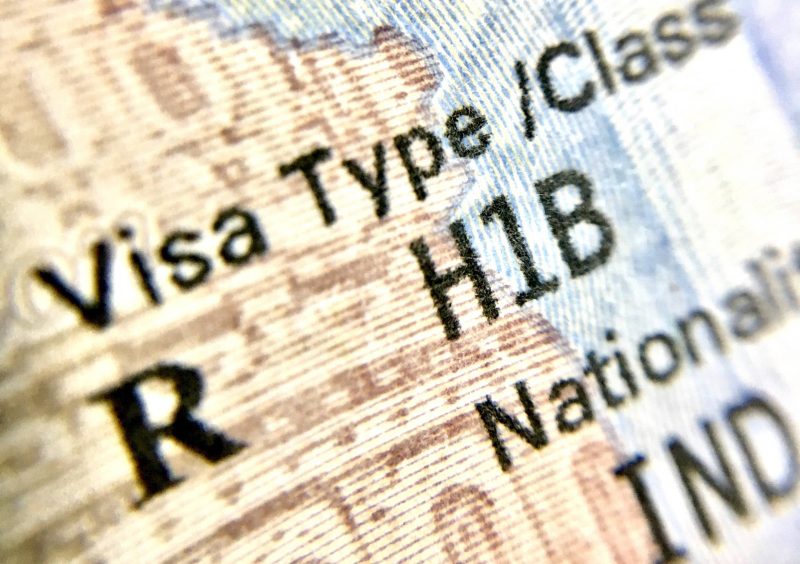
Although immigration observers have known for many years that the H-1B program tolerates extensive racial discrimination on behalf of young, male Indians from the south of that country, only relatively recently did the subject of discrimination appear in the federal courts.
Allegedly doing the discriminating are the huge, largely Indian-owned outsourcing companies, Tata Consultancies Ltd., Infosys, Cognizant, and others. As we reported earlier, their percentage of H-1B hires from India were: Tata, 99.7 percent; Infosys, 98.1 percent; and Cognizant, 99.6 percent.
In the oldest of these three cases, two of which were brought by a plucky little law firm in Washington's Adams-Morgan district (where I once lived), a recent interim decision by a federal judge in California has been handed down favoring the complainants and not the employer, Tata.
Meanwhile, also in the federal courts in that state, the well-known Judge Dolly M. Gee has been delaying an interim decision on a similar matter with Cognizant for more than six months. (She moved swiftly, however, against the administration on several aspects of the family separation matters, as my colleague Andrew Arthur has reported.)
A third case, in Texas, involving Infosys, has been shunted off to the arbitration process, a system that rarely helps workers. (There may be other, similar, H-1B discrimination cases in other courts, but we know the current status of these three.) This is where they stand at the moment.
Tata. This case, like the other two, is a civil case, in which named U.S. residents, former employees, argue that they have been discriminated against and that the employer owes them for damages. Should the workers win in these cases, they would secure a financial benefit and their lawyers be granted substantial fees for their efforts. This case, like the Cognizant one described below, is a class action suit, which might bring serious financial costs to the employers should they lose.
The named high-tech worker in this case is Steven Heldt, a U.S. citizen, who alleges that because he is not a South Asian (this case's terminology for Indian H-1Bs) he was discriminated against. In the complaint his lawyer charges:
Moreover, Mr. Heldt was told by a South Asian Tata manager, after Mr. Heldt was removed from a position, that he would have a hard time finding a new job within Tata because he was American and not South Asian.
The full text of the complaint, and other documents, can be seen in the courts' electronic data system, PACER, in case 4:15-cv-01696-YGR.
Tata attempted to limit potential costs to itself by filing a document in court saying that Heldt had nothing coming to him because he had not sought reinstatement of his job. The sitting judge, Yvonne Gonzalez Rogers, knocked down that argument on August 11 by calling it both "untimely" and a "Hail Mary effort to reduce the scope of relief", apparently a derogatory term in the courts. The trial for this case, filed in 2015, is set for November.
Cognizant. This case, like that against Tata, was filed by Kotchen & Low, the D.C. firm mentioned earlier. The PACER number is 2:17-cv-06848-DMG-PLA.
This case, unlike the Tata case, has been stalled since March 15 because the presiding judge has before her written briefs on the question of dismissing the suit. She has indicated that no hearings are necessary on the question, and nothing will happen until she rules on the pleadings before her.
Infosys. This firm has probably been sued more often for its foreign worker practices than any of the other outplacement firms, has lost at least one of these cases, and has set aside many millions of dollars in case of future losses, as we have reported previously (see here and here).
This case, while it may be going nowhere, involves a particularly interesting plaintiff; he is Erin Green and he is a lawyer; Infosys, with its many courtroom controversies, is probably kicking itself for hiring a lawyer and then treating him as it has other U.S. workers (i.e., badly). Some Infosys HR official may have been fired for such a monumental goof.
Infosys is, however, in a strong position in this case (PACER number 4:17-cv-00432-ALM, in the Eastern District of Texas) because Green signed an arbitration agreement as a condition of his employment. On February 26 of this year, the sitting judge ruled that the dispute — over racial discrimination — had to go to arbitration. That is the most recent filing in the PACER records.
I will try to remember to check on these cases every couple of months or so to see what, if anything, is happening.
If the Americans win one or more of these cases, maybe that will prod some governmental agency — I think it could be done at either the federal or the state level — to take action against these obviously discriminatory practices.
